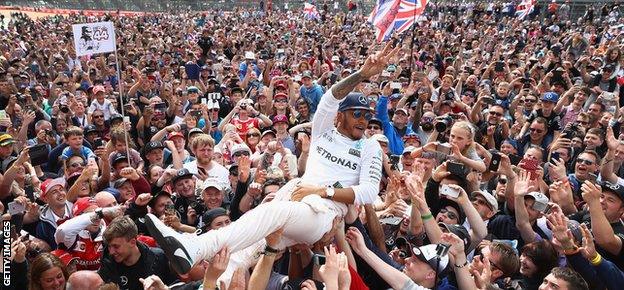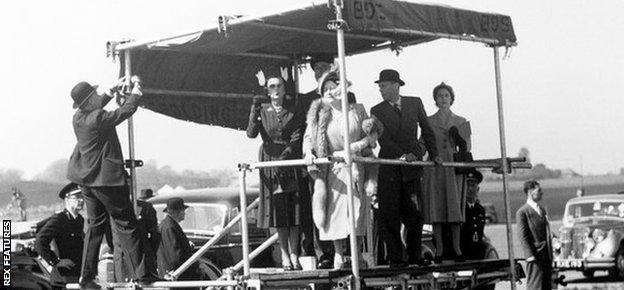British Grand Prix: Silverstone set to terminate contract after 2019 race
- Published
- comments

Silverstone has hosted the British Grand Prix on an exclusive basis since 1987
It has not definitively happened yet, but it is now almost certain that Silverstone will in the next few days exercise an option to end its contract to host the British Grand Prix after 2019.
To those unversed in the long-running politics surrounding the race, this will sound like shocking and worrying news. To long-time observers, it will be met with a wearisome sigh - "oh no, here we go again".
The future of the British Grand Prix has been in doubt for as long as many people in Formula 1 can remember. The current contract, signed at the end of 2009 for a 17-year period, was meant to end that. But it has done anything but. The devil was in the detail.
F1's former boss Bernie Ecclestone had a difficult relationship with Silverstone. Baiting them, criticising the track, its owners the British Racing Drivers' Club and pretty much anything to do with the race was something of a sport for him.
For Ecclestone, this was rooted in Silverstone's inability to pay him the money he wanted to host the race. Not benefiting from the largesse of a government, the BRDC has to make the event work financially, and as Ecclestone's fees went up, that became increasingly difficult.
That is still the core of the problem.
The current contract - signed at the end of a tedious few years of speculation and machinations concerning the future of the race - was for £12m in the first year, 2010. But it has a 5% annual escalator in it. So this year, the race is costing £16.9m. By 2019, it will be £18.6m, and by 2027, the final year of the deal if it were to run its course, £27.5m.

Lewis Hamilton has won the British GP four times - including the last three in a row
These numbers are massively less than some circuits are paying - for example, Bahrain pays at least $40m (£31m) a year; Russia $50m (£38.7m); Azerbaijan a reputed $75m (£58m).
But those races all have one thing in common - they are funded by authoritarian governments keen to promote their country to the world. Silverstone is a private members' club that has to run a viable business.
Silverstone desperately wants to host the British Grand Prix but it cannot do it at any price. The BRDC has a responsibility to protect the track in the interests of British motor racing. It cannot do that if it goes bankrupt because of the F1 contract.
Negotiations with the new owners of F1, who took over from Ecclestone in January, are still ongoing but have pretty much reached an impasse. F1, now owned by US group Liberty Media, has said it cannot renegotiate an existing contract. If it did, after all, the next thing would be they would have a whole bunch of other tracks knocking on their door demanding the same thing.
It has been leaked to Reuters, external that the F1 Group offered to take the race over for five years - saving Silverstone some money. But that only looks like largesse if you don't look very closely. It still leaves Silverstone with a contract from 2023-27 that it cannot afford.

No circuit can boast an older association with Formula 1 than Silverstone, which hosted the World Championship's first race in 1950, complete with makeshift royal box
So the circuit is set to end the contract and hope it can renegotiate a new one on better terms.
The BRDC knows this is a risk but it is a risk it cannot afford not to take.
So then the question becomes, what does F1 do next?
You can forget right off the bat any suggestion that any other permanent circuit in Britain could host the race. There is none suitable for a start - and none that could afford it either.
F1 chairman Chase Carey and commercial boss Sean Bratches have made it clear they value Silverstone highly and that they see the British Grand Prix as an irreplaceable part of the F1 calendar. But that does not mean the race has to be at Silverstone.
They have also talked about wanting races in "destination cities". That is usually a reference to a desire to have further events in the US in places such as New York and Los Angeles. But it could just as easily apply to the UK. After all, very few cities rival London for global cachet and appeal.
But the practical issues preventing a grand prix in London are immense - air quality, noise pollution, traffic complications, location, planning and, of course, money. Who would fund it? Where would the cash come from?
Carey and Bratches are highly accomplished businessmen but it would take some kind of miracle to resolve all those issues.
In reality, surely, if there is to be a British Grand Prix after 2019, it has to be at Silverstone. But there will likely be a whole load of hot air and headaches before it is finally sorted out.
- Published5 July 2017
